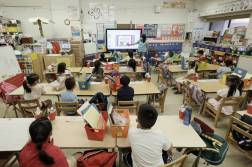Why K-12 educators should rethink their school schedules

At many schools, the end of the school year is accompanied by a mindless procedure: the previous master schedule is duplicated, teacher rosters are updated, but no other changes to the schedule are made, regardless of changes in the student population.
In addition to this practice being lazy, copying the same schedule year after year can lead to further segregating students and keeping low-performing students from reaching their potential. This was the message shared by educators in a recent webinar hosted by edWeb.net entitled “Using Student-Centered Scheduling to Address Equity.”
While reworking the master schedule may not be the most exciting part of a principal’s job, presenters Karin Chenoweth, Author of Schools that Succeed; Sergio Garcia, principal of Artesia High School in California; and Chris Fitzgerald Walsh, head of impact with school scheduling company Abl, say that it’s a critical job to ensure instructional time isn’t wasted.
Chenoweth, who studies high-performing schools, says successful schools push all students to succeed regardless of past learning history or demographics. High-performing schools share three key characteristics:
- Sense of urgency: These schools’ administrators understand that they have the students for a limited time each day and throughout their school careers. No assembly or instructional interruption is allowed unless it has a direct impact on improving student achievement.
- Scheduled (and nurtured) collaboration between educators: The schedule isn’t crafted in secret by administrators, and it isn’t a static document that lays untouched until the next school year. Administrators schedule time for educators to work together to discuss what’s working, what’s not, and what they need to do next to help students.
- Belief: At high-performing schools, leaders build a culture that says all students have the ability to succeed at a higher level. Intervention classes are meant to raise student potential, not relegate them to low classes with low expectations.
When Garcia became principal at Artesia, he established the goal of academic success for all, and changing the schedule was a key piece of that effort. However, he had to begin by educating the teachers about building a student-focused schedule and getting their buy-in before he could implement this dramatic shift in how his school thought about scheduling. Through training and conversations, his teachers have now embraced a new process that begins with the learners.
- First, guidance counselors work with students to gather their course requests.
- Then, teachers build their own master schedules.
- Next, department chairs work on these requests with their teachers.
- Finally, the department chairs bring these schedules to the administrators and work on a master schedule.
In addition to changing the regular school day schedule, Garcia also opened up AP and honors classes to all students, extended the school day, moved sports practice to later in the afternoon to allow for extra tutoring, and started a summer academy to prepare students for higher-level courses.
Most important, teachers at Artesia are not allowed to put personal restrictions on the schedule that could limit student learning.
“Everybody creates their own master schedule, but we know that … this is about students,” Garcia said. “We are not going to honor anybody’s requests. It is a culture we have created. I am the only one who puts constraints on the schedule.”
About the presenters
Karin Chenoweth is writer-in-residence at The Education Trust. She leads the organization’s efforts to learn from and write about successful and improving schools with significant populations of children of color and children living in poverty. In Schools that Succeed: How Educators Marshal the Power of Systems for Improvement, Karin explores what it looks like when expert school leaders ensure that all of a school’s systems — from supplies and schedules to discipline — are designed to support instruction. Schools that Succeed builds on her previous trilogy of “It’s Being Done” books but digs deeper to help educators see how they can move forward, even in dismaying circumstances. Karin holds a master’s degree from Columbia University’s School of Journalism and a B.A. from Barnard College.
Sergio Alejandro Garcia is the principal of Artesia High School in Lakewood, California, part of the ABC Unified School District. During his tenure, Mr. Garcia has led the transformation of Artesia High School through established targets, research-based instruction, and data analysis. He attributes much of this success to an intense focus on the master schedule, which he says is the “heart of the school.” Artesia High School serves a diverse student body of 1,500 students with 75 percent of students qualifying for Free and Reduced Lunch. (And most students will be the first in their family to attend college.) Artesia students consistently outperform students at similar schools in California, and the school boasts a 99 percent cohort graduation rate.
Chris Walsh is an experienced K-12 educator, media producer, and entrepreneur. Since his days as a middle school teacher, Chris has leveraged digital tools to bring large-scale innovations to teaching and learning. Chis currently leads Growth & Impact at Abl, a mission-driven edtech company offering next-generation scheduling solutions. Prior to Abl, Chris was the CEO of Zaption, an innovator in interactive video for learning; the company was acquired by Workday in 2016. Chris has held leadership positions with national education organizations including New Tech Network, WestEd, and the KIPP Foundation. He also co-founded the Google Teacher Academy and created the Infinite Thinking Machine, one of the first internet TV shows for educators.
Join the community
Leadership and Innovation is a free professional learning community on edWeb.net that serves as an online forum for collaboration on leadership and innovation in schools to meet the needs of the next generation.
The edWeb webinar referenced above, sponsored by Abl, can be found here.




